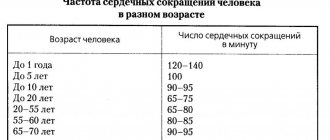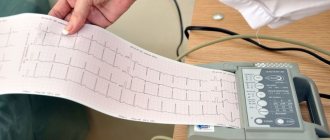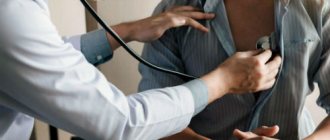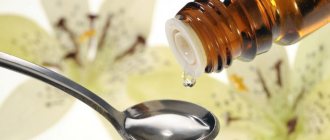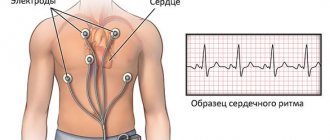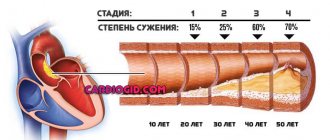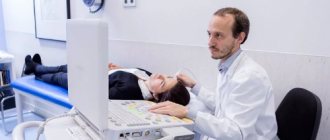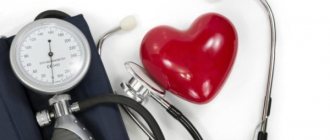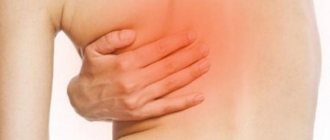The heart is one of the most vital organs in our body.
Any violations in its work can very seriously affect our well-being. Some disruptions to its functioning are quite dangerous and can lead to death or very serious complications. Most often, pain in the heart manifests itself as pain in the chest. Such pain is the most dangerous and requires immediate attention to a medical facility. There are situations when pain in the heart is permanent and manifests itself over a long period of time without worsening your well-being. Such symptoms, as a rule, are not critically life-threatening; they can be managed at home, but it is still worth seeing a cardiologist.
Types of heart pain
According to the mechanism of pain in the heart area, two main types can be distinguished:
- Anginal or ischemic pain - appears when there is a narrowing or complete blocking of blood flow in any artery that supplies the heart with oxygen. This leads to angina pectoris, and subsequently myocardial infarction. These are the most dangerous pains, the consequences of which are quite difficult to predict. In this case, it is strictly forbidden to self-medicate, as you can get very life-threatening complications.
- Cardialgia is all other pain that is not associated with blockage of the blood supplying arteries. Cardialgia can be inflammatory, rheumatic or neurotic in nature. If such pains are permanent, and a person knows the diagnosis, then he can stop their occurrence in certain ways.
How to distinguish cardialgia from anginal pain?
Knowing the clinical manifestations in both cases will help determine what kind of pain you are experiencing.
Anginal pain is characterized by:
- The occurrence of pain after a serious emotional shock or severe physical activity.
- The nature of the pain is pressing or squeezing.
- The pain is localized behind the sternum and spreads to the left side - shoulder, shoulder blade and arm.
- Symptoms may disappear or be significantly reduced after taking nitroglycerin.
- An attack of anginal pain may be accompanied by general weakness, dizziness, excessive sweating or loss of consciousness.
Such a clinical picture is a reason to immediately consult a doctor.
Cardialgia is characterized by the following manifestations:
- The pain is aching or stabbing in nature,
- Painful sensations arise gradually and last for a long time without significant deterioration,
- Most often, the pain is localized to the left of the sternum and does not spread to other parts of the body.
- In this case, the pain does not decrease when taking nitroglycerin, but you can observe a significant improvement in the condition when taking painkillers.
My heart hurts! What to do?
One of the most common reasons for visiting a doctor, especially a cardiologist, is cardialgia, i.e. pain in the heart area. However, this does not always indicate a pathology of our vital organ. First of all, cardialgia may be associated with dysfunction of the nervous system, especially at a young age. In adulthood and old age, the cause of cardialgia can be hormonal imbalance: menopause (especially premature) and the menopausal period.
Very often, cardialgia and thoracalgia (chest pain) are a consequence of osteochondrosis or other pathology of the spine, pathology of the costothoracic joints (Tietze's disease or syndrome) or the so-called intercostal neuralgia (Bronholm's disease).
Pathology of the pleura or lungs (usually inflammatory, less often the result of a neoplasm) is also, as a rule, accompanied by thoracalgia.
In diseases of the esophagus, stomach, and transverse colon, the leading complaint is often discomfort “in the area of the heart.”
If all of the above reasons are absent, most likely thoracalgia is associated with pathology of the cardiovascular system. Moreover, this does not always manifest itself as coronary heart disease (CHD), i.e. angina pectoris (angina pectoris). With sudden increases in blood pressure (crises), cardialgia occurs very often even without the presence of clinically significant ischemic heart disease (so-called hemodynamic angina).
Cardialgia is a leading symptom in inflammatory lesions of the heart muscle (myocarditis) and its outer membrane (pericarditis), and in anemia of various origins (most often iron deficiency). Cardialgia can occur with cardiomyopathies - a kind of degenerative changes in the heart muscle and/or its inner lining (endocardium), tumors of the myocardium or pericardium (both metastatic (more often!) and primary).
Here is a far from complete list of diseases that cause pain in the chest area (only the main, most common ones). But even from this minority of etiological factors (causes) of cardialgia, it is obvious that clarifying the cause-and-effect deviations of this symptom is an insoluble task for the patient and a very difficult task for the doctor. Every patient has the power to facilitate and speed up the diagnostic search for the doctor and help him avoid possible mistakes.
First of all, the patient is required to clarify the location of the pain, its nature (pressing, stabbing, feeling of “heaviness”, etc.), duration (seconds, minutes, hours, days, constant); provoking moments (physical activity (what kind), walking (the distance covered before pain appears on level ground, or climbing a certain number of flights of stairs, cold headwind), stressful situations, etc.). It is very important what medications relieve or relieve pain: nitrates (nitroglycerin tablets or its sprays) or sedatives, i.e. sedatives, which include validol, corvalol and their analogues.
Before visiting a doctor, it is advisable to monitor blood pressure (at least 3-5 times during the day), pulse, paying attention not only to its frequency, but also to its rhythm.
All this does not apply to retrosternal pressing pain that is not relieved by nitrates for more than 10-15 minutes. In this situation, you should call an ambulance team as soon as possible, which has been working for 6 years according to the most modern principles of providing care for suspected myocardial infarction.
In other cases, you should contact a cardiologist (general practitioner if there is no cardiologist on site) of the clinic.
An experienced cardiologist of the highest qualification category works in the Orenburg branch of MMC Medical On Group - Orenburg LLC; it is possible to record and analyze an electrocardiogram, including with physical activity; a complete clinical, biochemical and immunological examination, which ensures rapid diagnosis and prescription of optimal treatment.
Patients are accepted from any city and district of the region, nearby regions, republics, states (Bashkiria, Tatarstan, Kazakhstan).
Cause of heart pain
Anginal pain occurs for a single reason - acute coronary heart disease, which manifests itself in angina pectoris or myocardial infarction. There are many more reasons for cardialgia. Knowing the cause of cardialgia is critically important, as this affects the choice of treatment.
The most common causes of cardialgia are:
- Neurosis. Pain in the heart appears as a response to a large number of negative emotions and psychogenic stimuli.
- Inflammatory heart diseases - myocarditis, endocarditis, pericarditis, myocardial dystrophy, and so on.
- Heart disease that occurs against the background of other systemic diseases - hypertension, diabetes, kidney or thyroid dysfunction.
- Diseases of a rheumatic nature.
- Acquired or congenital heart valve defects.
- Benign tumors in the heart.
IMPORTANT: The cause of pain in the heart can be a fairly large list of diseases and pathological conditions of other organs and systems, which radiate pain to the sternum. For example, inflammation of the gastric mucosa, chronic or acute bronchitis, herpes zoster, intercostal neuralgia, chest injuries, neuroses and disorders of the nervous system, osteochondrosis of the thoracic spine.
When emergency hospitalization is needed for heart pain:
- If pain occurs suddenly,
- If pain occurs early in the morning or at night, when eating, under severe stress or after severe physical activity,
- If the pain is intense and unbearable, causing a burning sensation, pressure, squeezing or tearing,
- The pain radiates to the left side of the body, sometimes spreading to the stomach or back,
- The intensity of pain does not change with changes in body position, inhalation and exhalation,
- The pain is accompanied by shortness of breath, fear of death, panic, weakness, pale or cyanotic skin, nausea, vomiting and loss of consciousness.
The presence of at least some of these signs indicates the need for immediate hospitalization.
"Bad" cholesterol will never become good cholesterol
— You often hear from doctors about risk factors that every person should know about. But what is it and what should you pay attention to first?
- The most important risk factors for cardiovascular mortality, which had already become known by the end of the 50s, are the following conditions and diseases: age and family history - factors that cannot be influenced. But there are other factors: smoking, arterial hypertension, cholesterol levels, diabetes, obesity, which can be influenced. By the forties of the twentieth century, it became clear that people most often die not from infections, as was the case before, but from cardiovascular diseases. Therefore, the American Heart Institute was organized, and since 1948, in Framingham, a small town near Boston, all residents of the city were included in a study that continues to this day. They measured blood pressure, sugar, fibrinogen and many other indicators. These data were subsequently confirmed in large randomized controlled trials. Special tables have been created that allow one to estimate the risk of death within 10 years depending on the presence of selected factors. By the way, controlling these risk factors lengthens life and improves its quality.
— And what level of cholesterol in the blood can be considered normal?
— Not so long ago, a cholesterol level of 6.5 mmol/liter was considered the norm in Russia, and 3.5 mmol/liter in Japan. Now in Europe, the USA and Russia, the normal level of total cholesterol is considered to be below 5.2 mmol/l. However, the main indicator is low-density lipoprotein cholesterol, popularly called “bad cholesterol”. In people with a low risk of developing coronary heart disease, it should be less than 3.0 mmol/l, in patients with a high risk - less than 2.6 mmol/l, and in those who have atherosclerosis and its complications - coronary heart disease, brain disease and other vascular zones, its target level is less than 1.8.
— I was prescribed statins, but I’m afraid to take them, supposedly they cause cataracts, strokes, diabetes, impotence, etc. Is this true?
— Cholesterol in elevated quantities actually causes a number of diseases, primarily vascular damage. Statins are drugs that lower cholesterol levels, thereby preventing these diseases. But in addition to this, statins also have a unique anti-inflammatory effect inside blood vessels. To date, there are no drugs in this area that are more effective than them, and with few side effects. As for cataracts, stroke, impotence, research results do not confirm these complications. An increased incidence of diabetes mellitus was shown in one recent analysis, but mainly in patients with a hereditary predisposition to the disease. In diabetes mellitus, the benefits of such drugs are especially high, since it is with this disease that atherosclerosis develops more often and earlier.
photo: Alexandra Zinovieva
But: statins are not prescribed in the presence of severe liver failure and liver diseases; for this purpose, biochemical markers are initially monitored.
— Are statins prescribed in old age? I am 64 years old. When walking, pain began to arise in the legs, which went away very quickly after stopping. I can walk about 300–400 meters at a slow pace. Is this related to smoking? And where should I go?
— Statins are especially effective in old age, when the processes of growth of atherosclerotic plaques are most active. For patients over 80 years of age, I try to prescribe not the highest doses, taking into account the condition of other organs. As for pain in the legs, then, most likely, you have developed obliterating atherosclerosis of the arteries of the legs, which is characteristic of smokers. That is, the arteries that bring oxygenated blood to the legs are partially blocked by atherosclerotic plaques. Smoking often leads to damage to the arteries in the legs. What should we do now? First of all, do not wait for complete closure of the vessels and gangrene, but quit smoking to stop the progression of the process. Then do an ultrasound duplex scan of the arteries of the legs, preferably the vessels of the neck - smoking is the enemy of all blood vessels. Your cardiologist will then prescribe therapy to stabilize the plaque and improve blood flow. It will also become clear whether and what kind of vascular surgery is necessary. In any case, the success of therapy and surgery depends on you - you must quit smoking.
“My dad suffered a stroke, and now doctors say that more than half of his carotid arteries are closed. We are afraid of surgery. How can we solve this problem?
— If during the last six months your father suffered a stroke and a vascular examination revealed stenosis in the carotid arteries of more than 70%, then he is indicated for revascularization surgery, that is, an operation to restore normal blood flow in the arteries of the brain. In addition, all patients with atherosclerotic changes in the carotid arteries should receive optimal drug therapy to reduce cholesterol, blood pressure, blood sugar, etc.
What can you do at home before the ambulance arrives?
If acute chest pain occurs, it is necessary to record the time of the attack and immediately call an ambulance. Over the phone, describe the symptoms of occurrence: the presence of a stress factor or serious physical activity, the nature of the pain, the presence of pale skin or shortness of breath, and so on.
Before the medical team arrives, it is important to do the following:
- Try to calm the patient without using any medications,
- It is convenient to sit or lay the patient down, avoiding a position on the left side,
- Ensure air flow into the room,
- Remove clothes or unbutton them so as not to interfere with the free position of the body,
- Give one aspirin tablet, it will help make the blood less thick, which will improve blood circulation,
- Give a nitroglycerin tablet under the tongue, but if you are not sure that the pain is due to cardiac pathology, it is better to abandon this step. Nitroglycerin has the ability to dilate blood vessels and reduce blood pressure, which can be extremely dangerous for hypertensive patients.
- If the pain does not subside, then give another nitroglycerin tablet. It is allowed to take 3 tablets of nitroglycerin at intervals of 5 minutes. Even if the patient felt better after 20 minutes and the attack was stopped, hospitalization is still required to establish a diagnosis.
What can be done at home if hospitalization is not required?
If the pain in the heart is of the nature of cardialgia, then emergency hospitalization is not required; the patient can be helped at home. But in these cases, it is important to know what kind of disease you are dealing with.
Angina pectoris pain can be relieved by:
- Mustard plasters in the heart area. In five minutes it will dilate the blood vessels and cause blood flow. In addition, the burning effect of mustard will distract you from unpleasant sensations. Mustard plasters should be kept for no more than 20 minutes.
- The pepper patch has a similar effect; you should also not keep it on for more than 20 minutes.
- Mustard foot bath - dissolve a tablespoon of water in two liters of warm water, soak your feet for 10-15 minutes.
- Fir oil – rub 10-15 drops into the chest area for 5-7 minutes.
- 4-6 drops of validol per piece of sugar or in the form of one tablet under the tongue, the effect of the drug will begin in 2-3 minutes.
For high blood pressure and heart pain, alternating baths with cold and hot water will help. 10 minutes of contrasting alternation is enough - 2 minutes in hot, 20-30 seconds in cold.
For hernia and heart pain, drink half a glass of water with a dissolved teaspoon of soda.
For pain in the heart due to neurosis, depression or depression:
- Mix herbs in equal proportions - motherwort, peony, valerian, hawthorn. Pour one teaspoon of the mixture into a glass of boiling water, let it cool and divide into three parts. Drink 1/3 part in slow sips.
- Mix lemon balm and caraway herbs in equal proportions, brew a teaspoon of the mixture with boiling water, let it brew and strain. Divide into three parts and drink 1/3 part in slow sips.
What not to do if you have heart pain at home:
- Intense physical movement or exercise will only make the situation worse,
- Nervous
- Breathing deeply, doing any breathing exercises or massage can lead to a blood clot breaking off.
Self-help for chest pain
Pain in the heart area can be a manifestation of such forms of coronary heart disease as angina and myocardial infarction. In these cases, assistance should be provided as soon as possible. You need to know that not all chest pain is a symptom of heart disease.
Local stabbing, “shooting” pain in the chest, the nature of which changes when turning the body, applying pressure, or taking a deep breath, as a rule, does not require emergency treatment and is a manifestation of various types of dorsopathies (diseases of the spine). Usually in these cases the patient can point to the source of pain with one finger (though not always). Isolated pain in the abdomen, shoulder blades, back, shoulders, neck and lower jaw are rarely associated with coronary (cardiovascular) pathology. A typical painful attack with angina pectoris usually develops after physical activity; provoking factors are cold, windy weather, a stressful situation, smoking, and large meals.
Pain of cardiac origin, in the vast majority of cases, is localized behind the sternum or in the left half of the chest and has a sufficient area: the patient at the time of the attack indicates the source of pain by applying the palm of his hand, sometimes pointing to the entire surface of the chest. An anginal (painful) attack is accompanied by heaviness in the heart area, pressing or tearing pain, and burning. Patients often describe the pain, comparing it to a stone or slab squeezing the chest. In people suffering from hypertension due to coronary heart disease, increases in blood pressure are often accompanied by pain in the heart.
- If an attack develops during physical activity, incl. When walking, you need to stop. The patient needs to sit down; it is not advisable to lie down. If the attack occurs while lying down, you need to sit up and lower your legs. The goal is to reduce the load on the heart and cause blood to flow to the legs. Provide access to fresh air - open a window, unbutton your collar. For patients with chronic heart failure, manifested by shortness of breath, take a sitting or lying position with a high headboard.
- Take 1 tablet of nitroglycerin or 1-2 doses of nitro-containing spray under the tongue. Relief should occur within 1-2 minutes. If the effect is insufficient, repeat taking the drug after 3-5 minutes. To get the full dose of the drug when using a spray, the first dose of the drug is released into the air, and the second - under the tongue. Do not use nitrates while standing; fainting may occur due to a short-term decrease in blood pressure. Nitroglycerin increases intracranial pressure, which in some patients results in headaches. Do not use nitroglycerin and sprays if there is no pain and if blood pressure is significantly reduced (upper pressure is below 90 mmHg, with usually normal values at 120\80 mmHg). Do not put handfuls of tablets under your tongue and do not use several doses of the spray at a time, this is dangerous for the development of serious complications. After taking nitrates, do not get out of bed abruptly; first, spend some time in a sitting position.
- Measure your blood pressure. If it is elevated, take measures to reduce it (hypertensive drugs prescribed by your doctor).
- For severe restlessness and anxiety, take 40-60 drops of Corvalol or Valocordin, or tincture of motherwort, valerian (if there are no contraindications).
- If heart pain is not relieved within 15-20 minutes (with nitrates taken 2-3 times), call an ambulance. Before the ambulance team arrives, the patient needs to take aspirin (in the absence of contraindications: peptic ulcer, allergic reaction) in a dosage of 160-325 mg, and the tablets should be chewed. Use aspirin even if you have already taken it that day.
- Prepare the latest cardiogram performed on you and discharge summaries (extracts) from hospitals, if any.
Cardiologist of therapeutic department No. 2 Yulia Yurievna Ivanova
Preventing heart pain
Treatment of heart pain can be more successful, and pain syndromes less severe, provided that the disease is regularly prevented.
Here are simple ways to prevent heart problems:
- Physical activity. The heart is a muscle that needs training. Moderate and regular physical activity, which primarily trains endurance, will be a good means of prevention.
- Staying calm. Stress is one of the main triggers of heart problems, so it should be avoided. You can regain your calmness through breathing exercises, meditation or professional help from a psychologist. In consultation with your doctor, you can take sedatives and sedatives.
- Proper balanced nutrition. Getting enough potassium in your diet is essential for heart function. It can be found in sufficient quantities in grapefruits, seafood and nuts. You should avoid or minimize the consumption of fatty and salty foods.
- Rejection of bad habits. Drinking alcoholic beverages and smoking is another significant factor in the occurrence of heart problems. In addition, they can nullify all the above methods of prevention; they simply will not make any sense.
Remember that all folk remedies only reduce the degree of pain and do not have an analgesic or vasodilating effect. Therefore, it is imperative to consult a cardiologist to determine the cause of heart pain and select the optimal treatment method.
